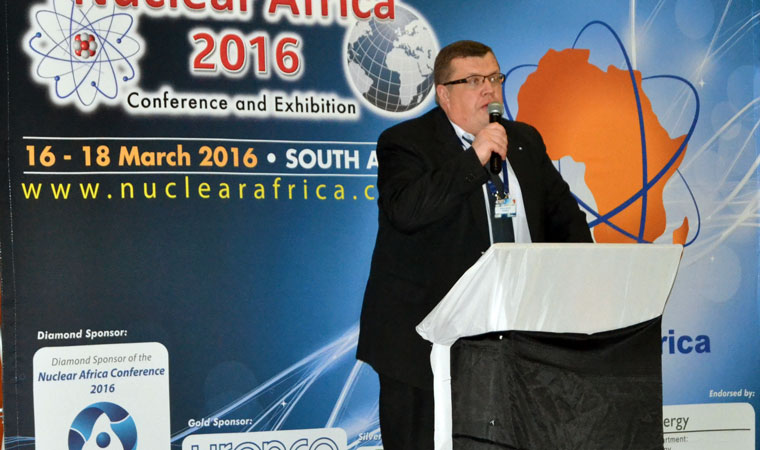
Africa: an end-to-end approach
back to contentsThe Russian delegation to the annual Nuclear Africa 2016 Conference was headed by Nikolai Drozdov, Director of Rosatom’s International Business Department, and included representatives of Rusatom Overseas Inc., Rusatom International Network and the Central Institute for Continuing Education and Training (CICET).
The chairman of the conference and chairman of the Board of Directors of the South African Nuclear Energy Corporation (NECSA) Kelvin Kemm said that the South African NPP construction program would open huge prospects for local vendors and help them benefit from the power plant construction. According to him, it is extremely important for the South African government to select a strategic foreign partner that has required competencies and expertise and is ready to share its advanced technologies with the country.
Speakers from Rosatom made presentations on its comprehensive approach, staff training, research reactors and nuclear technology centers. They noted, in particular, that the Russian state nuclear corporation offered its customers integrated nuclear services, ranging from project designs to staff training, nuclear station maintenance and spent fuel management. Nikolai Drozdov stressed that a reliable baseload power source will give the African industry a competitive advantage and facilitate a faster-than-expected GDP growth. “Construction of a nuclear station in South Africa will create more than 10,000 new jobs and generate $48.3 billion in revenue for local businesses and $52.5 billion in taxes for the government,” Drozdov said.
Rosatom offers its customers a similar integrated solution for research reactors and nuclear centers. Today, the South African Republic is a top African and leading global producer of medical and industrial isotopes. However, the service life of the existing Safari-1 research reactor is about to expire and makes it necessary to begin the construction of a new multi-purpose research reactor in the country as soon as practical.
In 2014, Rosatom and the South African Ministry of Energy signed an agreement for the construction of up to 8 reactor units. It also covers a number of other projects (including a research reactor) and Russia’s assistance in staff training and development of the power utility infrastructure in the country. The first step in staff training was made a few days ago when CICET Rector Yuri Seleznyov and Frikkie Van Niekerk, Deputy Vice-Chancellor for Research, Innovation and Technology from the North-West University (South Africa), signed a memorandum of cooperation in professional and short-term education.
“Continuous staff improvement will ensure sustainable development and make South Africa competitive on the global market of nuclear technology,” Seleznyov said. In his turn, Viktor Polikarpov, Rosatom Vice President for Sub-Saharan Africa, noted that professional staff for the South African nuclear industry, which celebrated its 50th anniversary in 2015, was a key condition for both construction and operation of a nuclear plant and an integral part of the national nuclear infrastructure. “It will help South Africa carry out joint nuclear projects with African and other countries,” Polikarpov said.
Earlier, Rosatom had signed two documents on cooperation in nuclear education, a memorandum of understanding on professional staff training with the Ministry of Energy and a memorandum of understanding on joint nuclear education programs with the North-West University.




